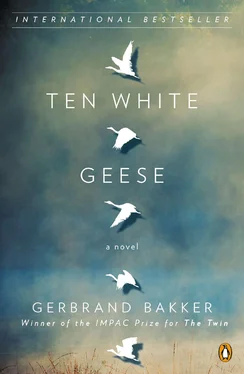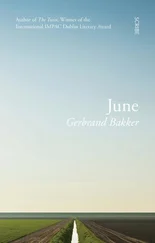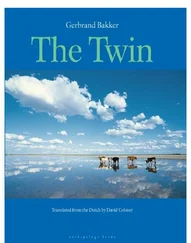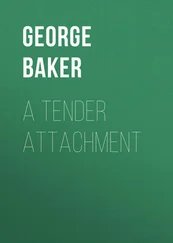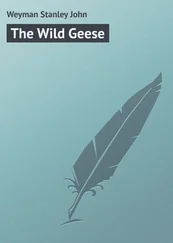The area around the house. She had driven to Bangor once to do the shopping but after that she went to Caernarfon, which was closer. Bangor was tiny but still much too busy for her. They had a university there and that meant students. She had no desire to set eyes on another university student, especially not a first year. Bangor was out. In the even smaller town of Caernarfon, a lot of the shops were closed, with FOR SALE daubed on the windows in white paint. She noticed shopkeepers visiting each other to keep their spirits up with coffee and cigarettes. The castle was as desolate as an outdoor swimming pool in January. The Tesco’s was large and spacious and open till nine. She still couldn’t get used to the narrow, sunken lanes: braking for every bend, panicking about left or right.
She slept in the small bedroom on a mattress on the floor. There was a fireplace, as in the large bedroom, but so far she hadn’t used it. She should have really, if only to see if the chimney drew. It was a lot less damp than she’d expected. Her favourite place upstairs was the landing, with its L-shaped wooden balustrade, worn floorboards and window seat. Now and then, at night, sitting on the window seat and looking out into the darkness through the tendrils of an old creeper, she would notice that she wasn’t entirely alone: somewhere in the distance there was a light. Anglesey was in that direction too and from Anglesey you could catch a ferry to Ireland. The ferry put out to sea at fixed times and at other fixed times it put into harbour. Once she saw the sea gleaming in the moonlight, the water pale and smooth. Sometimes she heard honking from the goose field, muffled by the thick walls. She couldn’t do anything about it; she couldn’t stop a fox in the night.
One day her uncle had walked into the pond, the pond in the large front garden of the hotel he worked at. The water refused to come up any higher than his hips. Other staff members pulled him out, gave him a pair of dry trousers and sat him on a chair in the warm kitchen (it was mid-November). Clean socks were not available. They put his shoes on an oven. That was about it, or what she knew of it anyway, no one ever went into any more detail. Just that he’d walked into the pond and stood there a while, wet up to his hotel-uniform belt. Surprised, perhaps. He must have judged the water to be deeper.
Her being here had something to do with that uncle. At least, she had begun to suspect as much. Scarcely a day passed without her thinking of him, seeing him before her in the smooth water of the hotel pond. So far gone that he hardly realised that hip-deep water wasn’t enough to drown in. Incapable of simply toppling over. All of the pockets of the clothes he was wearing stuffed with the heaviest objects he had been able to find in the hotel kitchen.
She hadn’t thought about him for a very long time. Perhaps she did now, in this foreign country, because it was November here too or because she sensed how vulnerable people are when they have no idea what to do next, how to move forward or back. That a shallow hotel pond can feel like a standstill, like marking time with the bank — no start or end, a circle — as the past, present and unlimited future. And because of that, she also thought she understood him just standing there and not trying to get his head underwater. A standstill. Without any form of physicality: no sex, no eroticism, no sense of expectation. In the few weeks she’d been in the house, with the exception of when she was in the claw-foot bath, she had not once felt any impulse to put a hand between her legs. She inhabited this house the way he’d stood in that pond.
She had set up the large bedroom as a study. More precisely, she had pushed the worm-eaten oak table that was there when she arrived over to the window and put a desk lamp on it. Next to the lamp she placed an ashtray and next to the ashtray she laid the Collected Poems of Emily Dickinson . Before sitting down at the table she usually slid the window up a little. When she smoked, she blew the smoke at the crack. In this room the leaves of the creeper annoyed her, so one day she took the rickety wooden stepladder from the pigsty and hacked the tendrils in front of the window away with a knife. That gave her an unimpeded view of the oaks, the fields and — very occasionally — the sea, and left her free to think about what the word ‘study’ still meant to her, if anything. Behind her was a divan she’d made her own by covering it with a moss-green cloth. She had stacked a few books on a small table next to it, but didn’t read a word. She’d put the portrait of Dickinson in the exact middle of the mantelpiece, in a Blokker picture frame. It was the controversial portrait, a copy of the daguerreotype that had been listed for sale on eBay.
Sometimes the light brown cows stood at the stone wall that separated the fields from her yard; they seemed to know exactly which window she was observing them from. My yard . I could do something with that, she thought, smoking one cigarette after another. She wondered which farmer the cows belonged to, where his farmhouse was. These hills brimming with streams and brooks and copses were much too complicated and confusing for her. Now and then she laid a hand on the Dickinson, running her fingers over the roses on the cover. She bought a pair of secateurs and a pruning saw at a hardware shop in Caernarfon.
She took the house as it was. There were a few pieces of furniture, a fridge and a freezer. She bought some rugs (all the rooms had the same bare, wide floorboards) and cushions. Kitchen utensils, saucepans, plates, a kettle. Candles. Two standard lamps. She kept the wood-burning stove in the living room going all day. The kitchen was heated by a typically British cooker that burnt oil from a tank squeezed between the side wall and the stream and hidden from view by a clump of bamboo. The enormous contraption doubled as a water heater. The day she moved in she found handwritten instructions on the kitchen table with a flat stone as a paperweight. Whoever wrote them signed off by wishing her Good luck! She wondered very briefly who it could be, but soon dismissed it as irrelevant. She followed the instructions on the piece of paper exactly, step by step, and wasn’t really surprised when it fired up. That night she was able to fill the large bath with steaming-hot water.
It was just those geese; they were peculiar. Had she rented the geese too? And one morning a large flock of black sheep suddenly appeared in the field beside the road, every one with a white blaze and a long white-tipped tail. On her land. Who did they belong to?
She discovered that the path that led to the stone circle — and went on beyond it, though she’d never been farther — joined her drive where it bent sharply. A kissing gate in a thicket of squat oaks was completely overgrown with ivy. By the look of it, nobody had been through it for years. On the far side of the gate was a field with long, brown grass. There had to be a house somewhere; a chicken coop with a dim light that burnt day and night stood a bit farther down the drive. She cut away the ivy with her new secateurs and sawed off the thick stems close to the ground. The gate still worked. She found an old-fashioned oil can in the pigsty and oiled the hinges. Only then did she realise that the path followed her drive, then crossed her yard before passing through a second kissing gate in the low stone wall and leading across the fields to the wooden bridge over the stream. A public footpath , apparently, and she had a vague recollection of that being something British landowners couldn’t do much about. With the hinges oiled, she walked to the road with the oil can still in her hand and turned right. After a couple of hundred metres she found the sign with the hiker, his legs overgrown with lichen. She didn’t dare climb over the stile, scared as she was of coming out at the house she still hadn’t seen. It was the first time she’d turned right. Caernarfon was to the left. She walked a little farther, the sunken road rising slightly. After about ten minutes she reached a T-junction and there she saw the mountain for the first time and realised what a vast landscape existed behind her house and how small an area she had moved in until that moment. All at once, she became aware of the oil can in her hand. She rubbed a blister on the inside of her thumb and quickly turned back. The geese honked loudly at her, as they had every time she’d walked past. The next day she bought an Ordnance Survey map at an outdoor shop in Caernarfon. Scale: 1–25,000.
Читать дальше
